The Project Gutenberg EBook of Artful Anticks, by Oliver Herford
This eBook is for the use of anyone anywhere in the United States and most
other parts of the world at no cost and with almost no restrictions
whatsoever. You may copy it, give it away or re-use it under the terms of
the Project Gutenberg License included with this eBook or online at
www.gutenberg.org. If you are not located in the United States, you'll have
to check the laws of the country where you are located before using this ebook.
Title: Artful Anticks
Author: Oliver Herford
Release Date: June 14, 2018 [EBook #57325]
Language: English
Character set encoding: UTF-8
*** START OF THIS PROJECT GUTENBERG EBOOK ARTFUL ANTICKS ***
Produced by David Edwards, Wayne Hammond and the Online
Distributed Proofreading Team at http://www.pgdp.net (This
file was produced from images generously made available
by The Internet Archive)
iii
iv
v
vi
Artful Anticks
 vii
vii
Artful Anticks
By
Oliver Herford

New York
The Century Co.
1901
viii
Copyright, 1888, 1889, 1890, 1891, 1892, 1893, 1894,
By The Century Co.
Copyright, 1894, by Oliver Herford.
The De Vinne Press.
ix
Table of Contents.
The pictures in “The Point of View” are used by permission of Messrs. Harper and Brothers.
xi
xii
xiii
Artful Anticks
1
The
Audacious Kitten.

“Hurray!” cried the kitten, “Hurray!”
As he merrily set the sails;
“I sail o’er the ocean to-day
To look at the Prince of Wales!”
“O kitten! O kitten!” I cried,
“Why tempt the angry gales?”
“I’m going,” the kitten replied,
“To look at the Prince of Wales!
“I know what it is to get wet,
I’ve tumbled full oft into pails
And nearly been drowned—and yet
I must look at the Prince of Wales!”
2
“O kitten!” I cried, “the Deep
Is deeper than many pails!”
Said the kitten,“I shall not sleep
Till I’ve looked at the Prince of Wales!”
“O kitten! pause at the brink,
And think of the sad sea tales.”
“Ah, yes,” said the kitten, “but think,
Oh, think of the Prince of Wales!”

3
“But, kitten!” I cried, dismayed,
“If you live through the angry gales
You know you will be afraid
To look at the Prince of Wales!”
Said the kitten, “No such thing!
Why should he make me wince?
If ‘a Cat may look at a King,’
A kitten may look at a Prince!”

4
The Artful Ant.
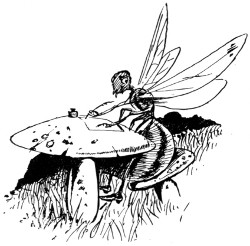
Once on a time an artful Ant
Resolved to give a ball,
For tho’ in stature she was scant,
She was not what you’d call
A shy or bashful little Ant.
(She was not shy at all.)
She sent her invitations through
The forest far and wide,
To all the Birds and Beasts she knew,
And many more beside.
(“You never know what you can do,”
Said she, “until you’ve tried.”)
Five score acceptances came in
Faster than she could read.
Said she: “Dear me! I’d best begin
To stir myself indeed!”
(A pretty pickle she was in,
With five-score guests to feed!)
5
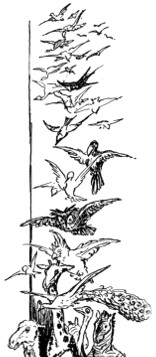
The artful Ant sat up all night,
A-thinking o’er and o’er,
How she could make from nothing, quite
Enough to feed five-score.
(Between ourselves I think she might
Have thought of that before.)
She thought, and thought, and thought all night,
And all the following day,
Till suddenly she struck a bright
Idea, which was—(but stay!
Just what it was I am not quite
At liberty to say.)
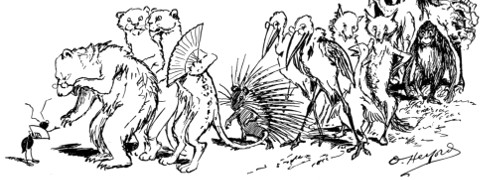
6
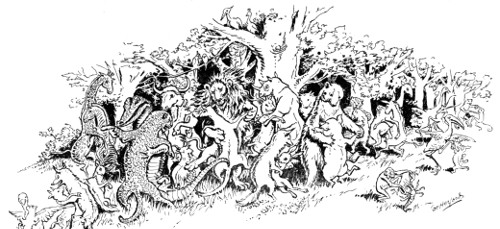
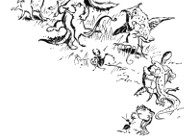
Enough, that when the festal day
Came round, the Ant was seen
To smile in a peculiar way,
As if—(but you may glean
From seeing tragic actors play
The kind of smile I mean.)
From here and there and everywhere
The happy creatures came,
The Fish alone could not be there.
(And they were not to blame.
“They really could not stand the air,
But thanked her just the same.”)

7
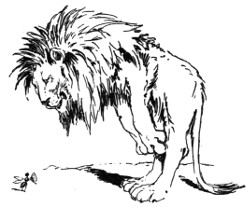
The Lion, bowing very low,
Said to the Ant: “I ne’er
Since Noah’s Ark remember so
Delightful an affair.”
(A pretty compliment, although
He really wasn’t there.)
They danced, and danced, and danced, and danced;
It was a jolly sight!
They pranced, and pranced, and pranced, and pranced,
Till it was nearly light!
And then their thoughts to supper chanced
To turn. (As well they might!)
8
Then said the Ant: “It’s only right
That supper should begin,
And if you will be so polite,
Pray take each other in.”
(The emphasis was very slight,
But rested on “Take in.”)
They needed not a second call,
They took the hint. Oh, yes,
The largest guest “took in” the small,
The small “took in” the less,
The less “took in” the least of all.
(It was a great success!)
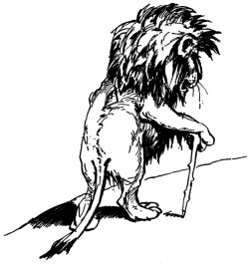
As for the rest—but why spin out
This narrative of woe?—
The Lion took them in about
As fast as they could go.
(And went home looking very stout,
And walking very slow.)
9
And when the Ant, not long ago,
Lost to all sense of shame,
Tried it again, I chance to know
That not one answer came.
(Save from the Fish, who “could not go,
But thanked her all the same.”)
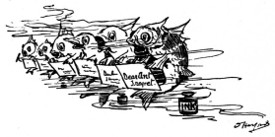
10
The Gifted Ant.
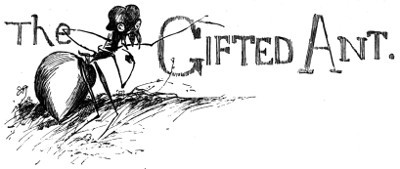
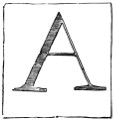
A gifted ant, who could no more
Than keep starvation from her door,
Once cast about that she might find
An occupation to her mind.
An ant with active hands and feet
Can, as a rule, make both ends meet.
Unhappily, this was not quite
The case with her of whom I write.
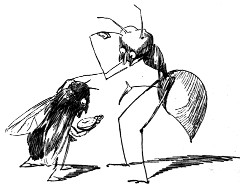
“Since I am gifted,” she’d explain,
“I ought to exercise my brain.
The only thing for me, it’s clear,
Is a professional career!”
11
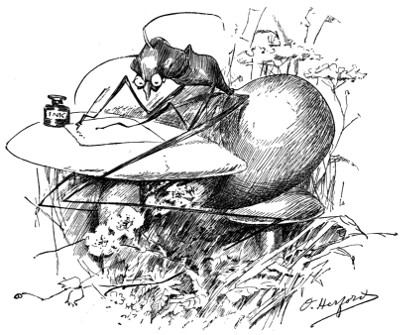
But no profession could she find,
Until one day there crossed her mind
The proverb bidding sluggards gaze
Upon the ant to learn her ways.
“The very thing!” she cried. “Hurray!
I’ll advertise without delay.
Things are come to a pretty pass,
If I can’t teach a sluggard class!”
12
She set to work without delay,
And wrote some cards that very day;
And hung them in the grass—a plan
To catch the sluggard’s eye. They ran
As follows:

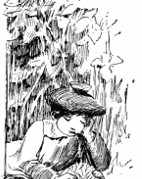
Sluggards who desire
An education to acquire
Will find it well to call to-day
Upon Professor Ant, B. A.
Her Sluggard Class, she begs to state,
Reopens at an early date
With several vacancies—a chance
Exceptional—
Terms—In Advance.

13
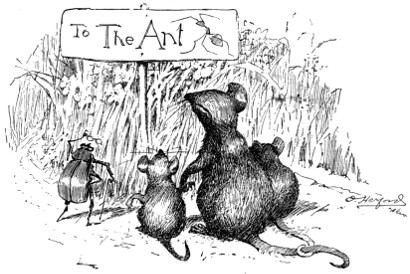
To The Ant
She placed at every turn that led
To her abode, a sign which read,
“Go to the Ant,” and hung beside
Her picture, highly magnified.
Said she, “At least that cannot fail
To bring a Turtle, Sloth, or Snail,
A Dormouse, or a Boy, to learn
Their livelihood (and mine) to earn!
“I’ll teach them, first of all, to see
The joyousness of industry;
And they, to grasp my meaning more,
Shall gather in my winter store.
14
“The Beauty of Abstemiousness
I’ll next endeavor to impress
Upon their minds at meals. (N. B.
That is—if they should board with me.)
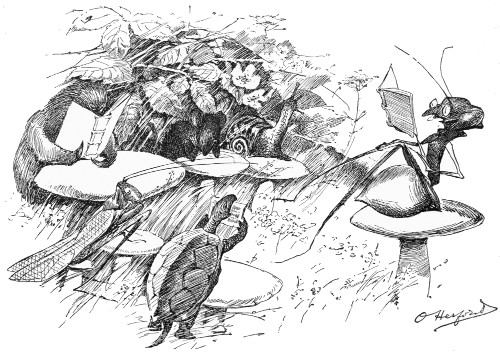
“Then Architecture they shall try
(My present house is far from dry)—
In short, all Honest Toil I’ll teach
(And they shall practise what I preach).”
15
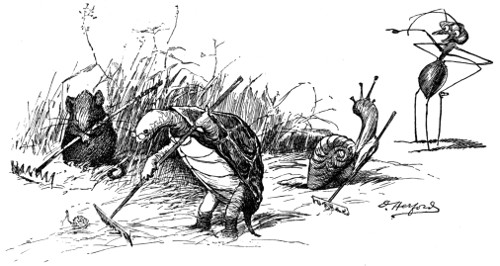
Alas, for castles in the air!—
There’s no delusion anywhere
Quite so delusive as, I fear,
Is a professional career.
So thought the ant last time we met.
She only has one sluggard yet,
Who scantly fills her larder shelf—
It is, I grieve to say, herself!
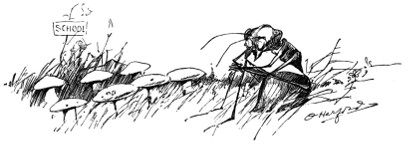
16
Sir Rat.
A·Comedy·
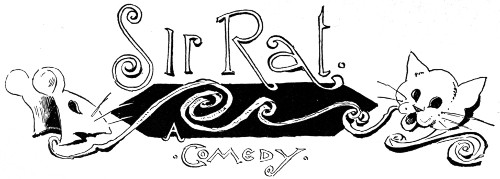
Persons of the Drama.
Mr. Thomas Cat.
Mrs. Thomas Cat.
Master Tommy Cat.
Miss Fluffy Cat.
Sir Rat.
Scene: The barn. A basket in one corner.
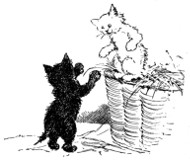
Master Tommy (looking out of the basket).
How very big the world is, after all!
Compared to it our basket seems quite small,
We never dreamed, dear Fluffy, till our eyes
Were opened, that the world was such a size.
I’d like at once to see it all. Let’s go
And take a stroll around it.
Fluffy. No! No! No!
Mama expressly told us not to stray
Outside the basket while she was away.
Something might happen if we disobeyed.
Tommy. Oh, you’re a girl—of course you are afraid!
17
Fluffy. Suppose—oh, dear!—suppose we meet a Rat!
Tommy. Suppose we do, dear Fluffy, what of that?
I will protect you with my strong right paw.
The sight of me would fill a Rat with awe.
Fluffy. Would it?
Tommy. Of course it would. I’d like to see
The Rat who’d dare to trifle once with me,
I do not think he’d live to try it twice!
Fluffy. You are so brave! It really would be nice
To see the world—
Tommy. It will be grand. Here goes!
There, take my paw, and jump. So, mind your toes!
(Fluffy jumps.)
Now we are off. Tread softly, Sister dear,
If we’re not careful all the world may hear.
Fluffy (starting).
Oh, dear, what was that noise? I wish we’d stayed—
Tommy (trembling).
Be brave, dear Sister,—see, I’m n’-n’-not a’-afraid.
Whatever happens, do not make a row!

18
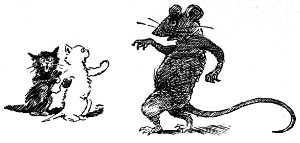
(Enter Sir Rat.)
Sir Rat. Aha! what’s this?
Tommy. Help! Murder! Mi-ow-ow!
Fluffy. Tommy, be calm! Dear Mr. Rat, good day.
Sir Rat (jumping up and down).
Enough! enough! I did not come to play!
Fluffy. Dear Mr. Rat, how beautifully you dance.
Sir Rat. You flatter me.
Fluffy (aside). It is my only chance.
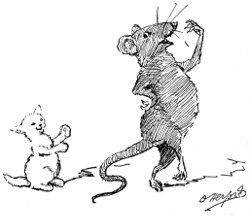
(To Tommy.)
Run, Tommy! run! and bring dear Father-cat,
While I remain and flatter Mr. Rat.
(Exit Tommy, in haste.)
19
(To Sir Rat.)
It’s very plain you learned that step in France.
I wish, dear Rat, you’d teach me how to dance.
Sir Rat. I do not often dancing-lessons give;
But since you haven’t very long to live,
And you are so polite, this once I’ll try.
Fluffy. Thanks! thanks, dear Rat,—one dance before I die.
(Polka music. Sir Rat dances and Fluffy applauds.)
Fluffy. Bravo! Sir Rat, I never saw before
Such perfect dancing! Won’t you dance once more?
Sir Rat. Be done with folly, Kitten! Now at last
Your time has come. Reflect upon your past!
Fluffy. It won’t take long my past life to unfold!
In sooth, Sir Rat, I’m only nine days old.
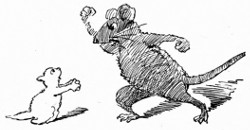
Sir Rat. Peace, Kitten! Hold thy peace!—thy time is past.
(Springs upon her.)
Fluffy. Miow! Miow!
20
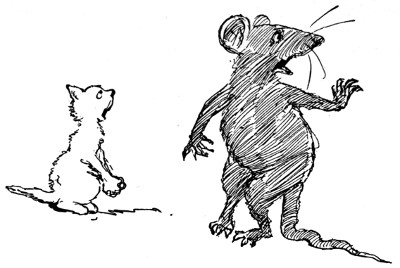
(Enter Mr. and Mrs. Cat and Tommy.)
Mr. Cat. Aha! Sir Rat, at last
I have thee; and this barn will soon, I trow,
Be rid of such a Ruffian Rat as thou!
(They fight. Sir Rat falls.)
Mr. Cat (sheathing his claws).
’Tis well I hastened; had I not, I fear
We soon had seen the last of Fluffy dear!
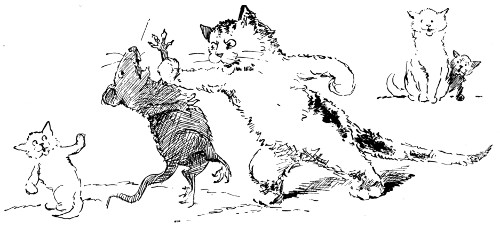
21
Tommy. Oh, dear, to think what might have been her fate!
Fluffy (aside). I learned that Polka step, at any rate.

Mrs. Cat. But luncheon’s waiting. Come into the house.
Your father caught to-day a fine spring mouse.
And, children, when I tell you not to stray
From home, in future do not disobey!
Curtain.
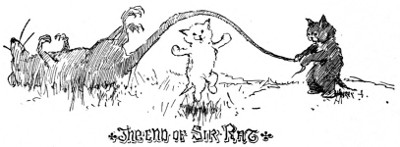
✙The end of Sir Rat✙
22
The Deceitful
Dormice.
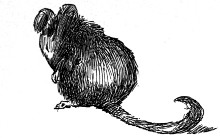
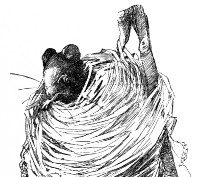
A sleepy Dormouse who had passed
The winter in her nest,
Hearing that spring had come at last,
Got up at once and dressed,
And, hastening from her downy house
To hail the new spring day,
She ran against another mouse
That lived across the way.
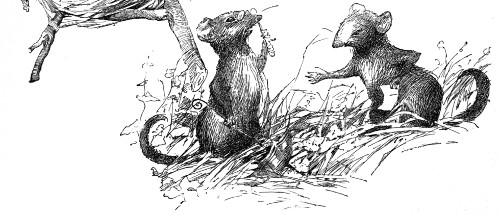
23
The shock was such, at first the two
Could scarcely speak for lack
Of breath. Then each cried, “Oh, it’s you!!
Why, when did you get back?”
“I’ve only just return’d, my dear,”
The sleepy Dormouse said,
“From Florida—the winters here,
You know, affect my head.”
“Have you, indeed?” exclaimed her friend.
“I’m glad to see you home.
I, too, have just returned—I spend
My winters down in Rome.”
With many pawshakes then, at last
They parted—each to say,
“I wonder where that creature passed
The winter—anyway!”
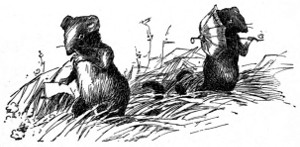
24
Nature and Art.
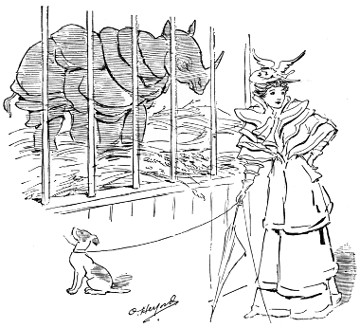
Said a lady who wore a swell cape,
As she viewed a Rhinoceros, agape,
“To think in this age
A Beast in a cage
Is permitted our fashions to ape!”
Thought the Beast in the cage, “I declare,
One would think that these Ladies so fair
Who come to the Zoo
Have nothing to do
But copy the things that I wear!”
25
The
Geometrical
Giraffe.
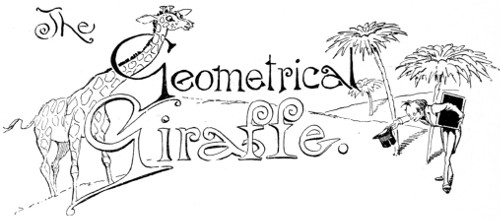
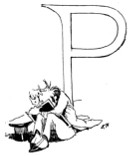
Professor Pikestaffe, Ph. D.,
While wandering over land and sea,
Once on the plains of Timbuctoo
Met a giraffe.
“Why, how d’ ye do!”
Exclaimed the amiable Pikestaffe.
“I’m really charmed, my dear Giraffe!
I’ve thought so much of you of late,
Our meeting seems a stroke of Fate
Particularly fortunate.
I long have had upon my mind
Something concerning you; be kind
Enough to seat yourself, and pray
Excuse, if what I have to say
Seems personal!”
26
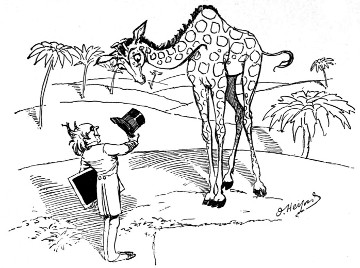
“My dear Pikestaffe,
I shall be charmed,” said the Giraffe,
“To hear whatever you may say.
You are too kind; go on, I pray.”
“Well, then,” said Pikestaffe, “to resume,
You are aware, sir, I presume,
That though with your long neck at ease
You crop the leaves upon the trees,
Your legs are quite too long, and make
It difficult for you to slake
Your thirst—in other words, you’ve found
Your neck too short to reach the ground.
Indeed, I’ve often wept to think
How hard it is for you to drink.
27
“To right a wrong we must, of course,
First try to ascertain the source;
And in this case we find the cause
In certain geometric laws,
Which I will quickly demonstrate
(How lucky that I brought my slate!).
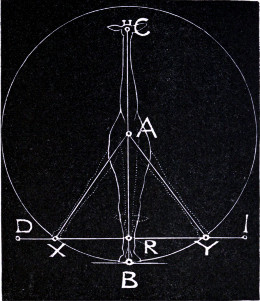
“Well, to begin, let line A B
Be your front legs; then line A C
(A shorter line) your neck shall be.
Measured, ’twill only reach so far,
When bent down toward the ground, as R.
28
Then R’s your head stretched down, and shows
How far the ground lies from your nose—
Though if the ground lay not at B,
But R, you’d reach it easily.
Suppose it then at R to lie,
And draw for ground line D R I.
Your head then touches ground at R—
But now your feet go down too far!
My compasses then I will lay
On A and B, and make round A
A circle crossing line D I
At two points. Mark them X and Y;
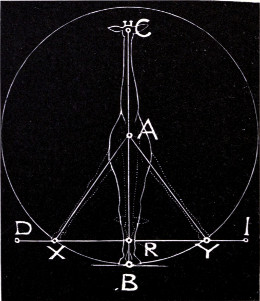
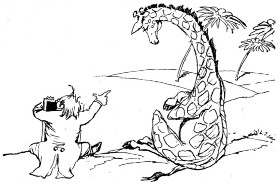
29
Then draw from X and Y to A
Two lines; then it is safe to say
That line A X and line A Y
Equal A B, being radii
Of the same circle, as you see
(According to geometry).
But since at first we did agree
A B your length of leg should be,
These, being equal to A B,
Are just the same as legs, you see.
So now on legs A X, A Y.
You stand upon the ground D I,
And drink your fill; for, as I said,
D I is touched by R, your head.
30
Thus we have proved—”
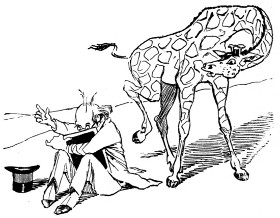
What happened here
Professor Pikestaffe has no clear
Impression, but the little row
Of stars above will serve to show
What madly reeled before his eyes,
As he went whirling to the skies.
Below he heard a mocking laugh,
That seemed to come from the Giraffe:
“Go up! go up! You’ve proved enough;
You’ve proved geometry is stuff!
You’ve proved, till I am well nigh dead,
And feel a thumping in my head,
That I must spread my feet apart
To take a drink—why, bless your heart!
31
I knew that long ere you were born.
I laugh geometry to scorn.”
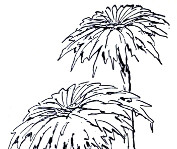
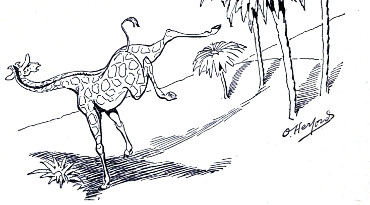
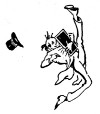
Professor Pikestaffe, Ph. D.,
They say, has dropped geometry—
It seems he dropped his slate as well,
Which lies exactly where it fell
(Also the diagram he drew)
Upon the plains of Timbuctoo.
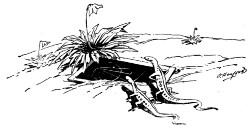
32
The Early Owl
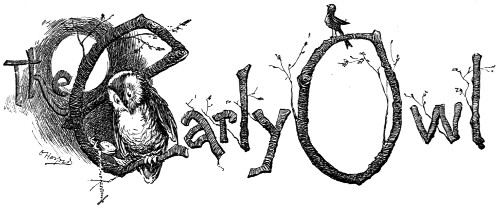
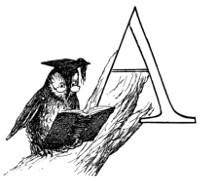
An Owl once lived in a hollow tree,
And he was as wise as wise could be.
The branch of Learning he didn’t know
Could scarce on the tree of knowledge grow.
He knew the tree from branch to root,
And an Owl like that can afford to hoot.
And he hooted—until, alas! one day
He chanced to hear, in a casual way,
An insignificant little bird
Make use of a term he had never heard.
He was flying to bed in the dawning light
When he heard her singing with all her might,
“Hurray! hurray for the early worm!”
33
“Dear me!” said the Owl, “what a singular term!
I would look it up if it weren’t so late;
I must rise at dusk to investigate.
Early to bed and early to rise
Makes an Owl healthy and stealthy and wise!”
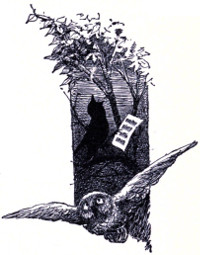
So he slept like an honest Owl all day,
And rose in the early twilight gray,
And went to work in the dusky light
To look for the early worm all night.
He searched the country for miles around,
But the early worm was not to be found.
So he went to bed in the dawning light,
And looked for the “worm” again next night.
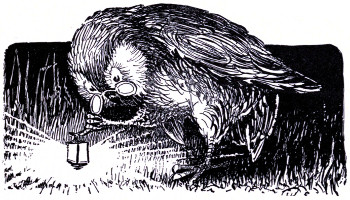
34
And again and again, and again and again
He sought and he sought, but all in vain,
Till he must have looked for a year and a day
For the early worm, in the twilight gray.
At last in despair he gave up the search,
And was heard to remark, as he sat on his perch
By the side of his nest in the hollow tree,
“The thing is as plain as night to me—
Nothing can shake my conviction firm,
There’s no such thing as the early worm.”
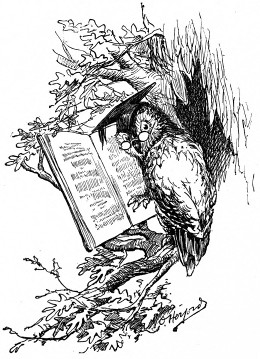
35
A Dark Career

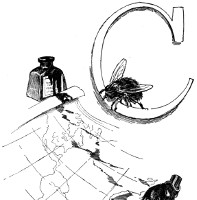
Call it misfortune, crime, or what
You will—his presence was a blot
Where all was bright and fair—
A blot that told its darksome tale
And left its mark a blighting trail
Behind him everywhere.
*
*
*
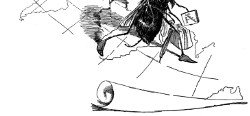
He stood by the Atlantic’s shore,
And crossed the azure main,
And even the sea, so blue before,
About his wake grew dark and bore
The semblance of a stain.
36
On English soil he scarcely more
Than paused his breath to gain;
But on that fair historic shore
There seemed to gather, as before,
A darkness in his train.
Through sunny France, across the line
To Germany, and up the Rhine
To Switzerland he came;
Then o’er the snowy Alpine height,
To leave a stain as black as night
On Italy’s fair name.
From Italy he crossed the blue,
And hurried on as if he knew
His journey’s end he neared.
On Darkest Africa he threw
A shade of even darker hue,
Till in the sands of Timbuctoo
His record disappeared.
*
*
*
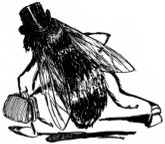
Only an inkstand’s overflow,
O Bumblebee! remains to show
The source of your mishap;
But though you’ve flown my ken beyond,
The foot-notes of your tour du monde
Still decorate my map.
37
A Packet
of Letters
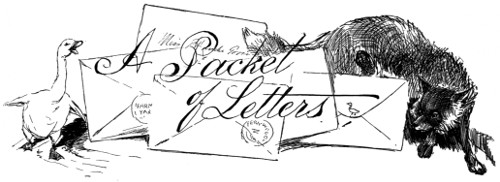
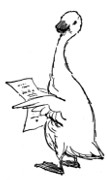
I.
FROM MR. RUFUS FOX TO MISS BLANCHE GOOSE.
The Fernwoods, Friday.
Dear Miss Goose:
Accept apologies profuse,
For the abrupt and hasty way,
In which I left you yesterday.
I don’t know how I came to be
So very rude, but then you see,
I was just offering my arm,
38
When stupid Rover from the farm,
Appeared so suddenly, and so—
Well, two is company, you know,
While three—! Besides, ’twas getting late,
So I decided not to wait.
Yet, after all, another day
Will do as well. What do you say?
Can you contrive to dine with me
To-morrow afternoon at three?
Pray do, and by the hollyhocks
Meet yours, sincerely,
Rufus Fox.

II.
FROM MISS BLANCHE GOOSE
TO MR. FOX.
The Farmyard, Friday afternoon.
Dear Mr. Fox, it seems so soon,
You almost take my breath away!
To-morrow? Three?—what shall I say?
Nothing could charm me more—but, no—
Alas! I fear I cannot go.
Don’t think that I resent, I pray,
Your hastiness of yesterday.
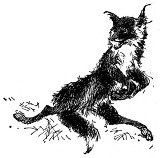
39
It is not that. But if I went,
Without my dear Mama’s consent,
And she should somehow chance to hear,
She would be dreadfully severe;
And so, oh, dear! it is no use!
Believe me,
Sadly yours,
Blanche Goose.
P. S.—On second thoughts, dear Fox,
I’ll meet you by the hollyhocks,
For if Mama but knew how kind
You are, I’m sure she would not mind,
To-morrow, then—we’ll meet at three;
Don’t fail to be there. Yours,
B. G.
III.
FROM MR. RUFUS FOX TO HIS COUSIN REYNARD.
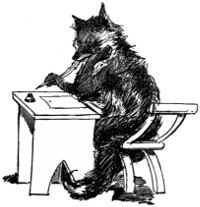
Friday.
Dear Cousin, just a line
To ask if you will come to dine
(Informally, you know) with me
To-morrow afternoon at three.
Now don’t refuse, whate’er you do,
I have a treat in store for you:
A charming goose (and geese, you know,
Do not on all the bushes grow!)
40
A dream of tenderness in white,
A case of “hunger at first sight.”
I know, old boy, you’ll not be deaf
To this inducement.
Yours,
R. F.
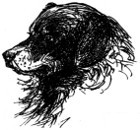
P. S.—Miss Goose agrees to be
Beside the hollyhocks at three!
IV.
EXTRACT FROM THE DIARY OF ROVER,
THE DOG.
Saturday night.
Well, I must say,
I quite renewed my youth to-day!
How lucky that I chanced to go,
Just when I did, beside that row
Of hollyhocks beyond the gate!
Lucky for her at any rate;
For suddenly I heard Miss Goose
Struggling and crying, “Let me loose!”
And, from behind the hollyhocks,
Who should jump out but Mr. Fox!
(The very same one, by the way,
I almost caught the other day.)
Soon as I nabbed him, in his fright,
He dropped Miss Goose and took to flight.
41
Then after him like mad I flew,
But—what could poor old Rover do?
I am not what I used to be,
So I let go, and ran to see
At once how poor Miss Goose had fared,
And found her much less hurt than scared
From having come so near the noose:—
A sadder and a wiser goose.
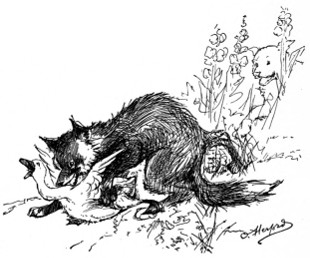
V.
NOTE FROM MR. RUFUS FOX TO HIS
COUSIN REYNARD.
Dear Cousin:
This is just to say
Why dinner was postponed to-day,—
The goose had failed us, that was all;
Excuse, I beg, this hurried scrawl.
Will write to-morrow to explain—
42
Just now my paw is in such pain
That when I try to write it shocks
My nerves.
Yours truly,
Rufus Fox.
P. S.—I’d thank you if you sent
A bottle of that liniment
You spoke of several days ago—
The kind for “dog-bites,” don’t you know.
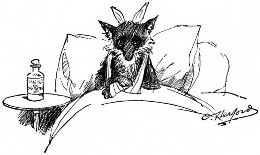
43
The Naughty
Fay
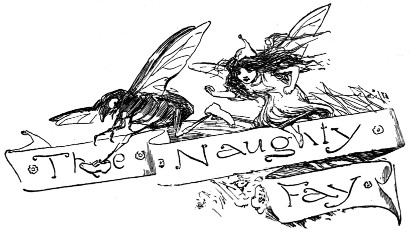
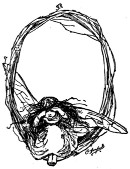
Once a naughty fay
Chanced to sprain her wing;
“At her tricks,” they say—
“Naughty little thing!”
Said the little fay
As she lay in pain,
“No more tricks I’ll play
When I’m well again.”
44
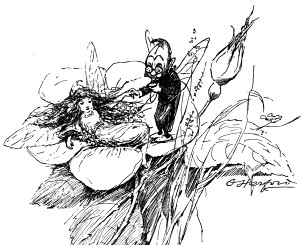

Time heals everything.
Can this be our fay,
She who sprained her wing
Just the other day?
Can she be this fair
Thrifty little thing,
Sewing up a tear
In a beetle’s wing?
Yes,—alas! but oh,
Not a thrifty elf;
Of course she has to sew
What she tore herself!
45
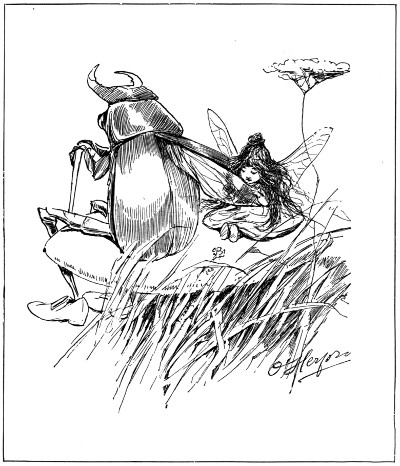
46
The
Miller’s Quest
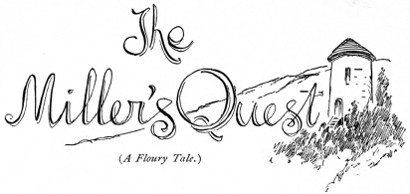
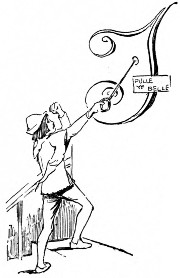
(A Floury Tale.)
The Princess’ hair hath golden sheen,
And her cheek is lily-pale;
But none may look in her eyes, I ween
And live to tell the tale.
From out the south, and eke the north,
And from the east and west,
Full many a gallant knight rides forth
Upon the fatal quest.
For a cruel spell on the Princess lies
No mortal can undo
Till one shall look into her eyes
And tell their color true.
47
And some of them swear her eyes are green,
And some that they are black,
And many a knight rides forth, I ween,
But never a one rides back.
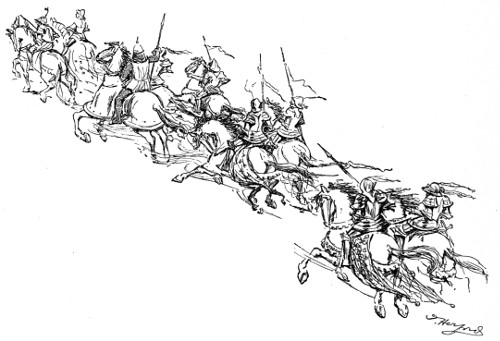
For a cruel spell on the Princess lies,
And whoso will may try
His fate, and look into her eyes;
But whoso quails must die.
*
*
*
The miller’s son is a dusty youth,
And dusty curls hath he.
Quoth he, “I’ll go myself, forsooth,
And set this Princess free.”
48
The miller’s son he hath no spear
Nor sword nor coat-of-mail,
But an honest heart that knows not fear—
Heaven grant he may not fail!
The miller’s son at the portal knocks,
At the Princess’ feet he bends,
And he tosses aside his floury locks
And a floury cloud ascends.
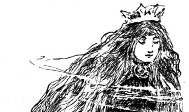
The Princess’ face in a mist of white
Is veiled as with a veil,
Her eyes are dimmed of their deadly light,
And the miller doth not quail.
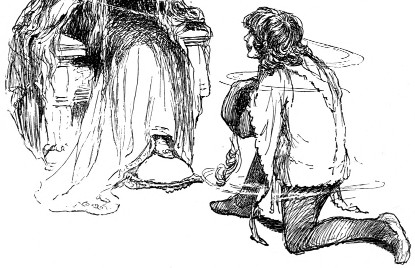
49
The Princess’ hair hath golden sheen,
Her cheek is red, red rose,
And her eyes?
*
*
*
Go ask the Prince—
I mean
The miller’s son—he knows.
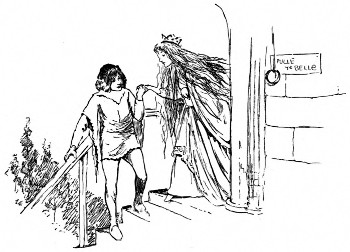
50
Nell’s Fairy-tale.
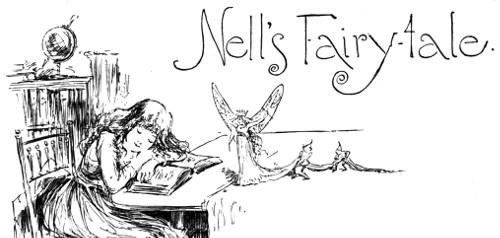
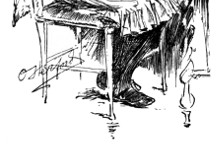
The fairy tale was ended, the wicked Queen had fled;
The Prince had saved the Princess and cut off the monster’s head;
The people all were joyful, and the Princess and the Prince
Were married and—so ran the tale—“lived happy ever since.”
Nell closed the book of fairy tales and mused: “I wonder why
There are no fairies nowadays? I only wish that I
51
Could be a fairy princess like the Princess Goldenhair.”
Here Nell dropped off to sleep, and then she started in her chair,
When, of its own accord, the book popped open, and behold!
Out crept a wee elf-princess all arrayed in cloth of gold;
She sighed a little tired sigh and then Nell heard her say,
In a tiny tired little voice, that sounded far away:
“Oh, dear! how very nice it is for once to get outside.
You’ve no idea how flat it is, my dear, until you’ve tried,
To be shut up in a story-book with Dragons, Queens, and Kings,
And always have to do and say the same old, senseless things;
You think it would be very fine, but really it’s no joke!
I’d rather be a girl, like you!—”
Then little Nell awoke,
“Poor Princess Goldenhair,” said she,—“unhappy little elf,
I’m rather glad, upon the whole, that I am just myself!”

52
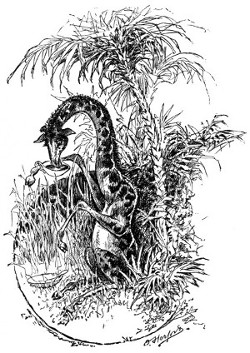
The
Unfortunate
Giraffe.
There was once a Giraffe who said, “What
Do I want with my tea strong or hot?
For my throat’s such a length,
The tea loses its strength,
And is cold ere it reaches the spot.”
53
Stockings or Scales.
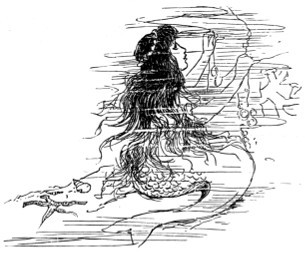
If I were asked of all things what I most would like to be,
I’d choose to be a mermaid and live below the sea.
How nice, instead of walking, to swim around like little whales,
And to wear, instead of stockings, many shiny pairs of scales,
Which don’t need changing every time that nurse says they are wet.
And then to have no shoes that always come untied!—and yet—
And yet, although it must be nice to swim around in scales,
To attend a school of porpoises and play at tag with whales,
To be on friendly speaking terms with jellyfish and eels,
And never to be sent to bed or told I’m late for meals;
Still, when I think of Christmas Eve my resolution fails,
How could I hang my stockings up if I had only scales?
54
A Riddle.
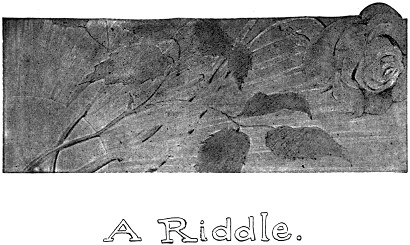
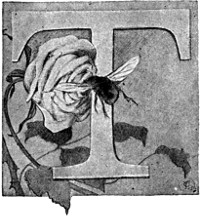
They were three robbers; aye,
And they robbed a red, red rose;
And they came from out the sky,
And they went where no man knows.
One came when the day was young,
And rent the curtain gray
Of mist that round her hung,
And he stole her pearls away;
One came when the day was old,
And a sable coat he wore,
And a belt of dusty gold,
And he robbed her treasure-store.
55
One came when the day was dead,
And no man saw him pass;
And he caught her petals red
And threw them upon the grass.
Three robbers bold were they,
And they robbed a red, red rose;
And they came and went away,
And whither—
no man knows.
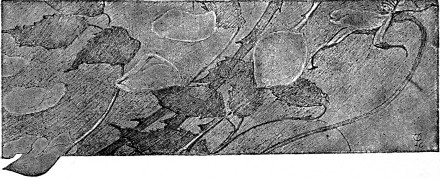
56
Good·bye.
A Woodland Episode.
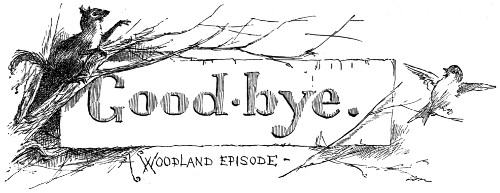
PERSONS OF THE DRAMA: Miss Bird, and Mrs. Chipmunk.
Scene: The woods. Time: Last November.
Miss Bird.—Why, Mrs. Chipmunk! how do you do?
Mrs. Chipmunk.— I’m quite well, thanks, Miss Bird; and you?
Miss B.—I’m sorry to say my health is poor,
So my doctor has ordered a southern tour.
Couldn’t you manage to come along?
It would do you good—
Mrs. C.— Yes, I’m far from strong,
And it’s just what I’d most like to do
If I’d only a pair of wings—
Miss B.— Pooh! Pooh!
There are trains for people who cannot fly.
Mrs. C.—Yes, but the fares are so dreadfully high!
So really I mustn’t think of that—
Miss B.—If only you’d wings like your cousin Bat.
Mrs. C.—If only! but then I haven’t, you see.
Besides, I’ve rented a hole in a tree,
57
On the first-floor branch just four trees west
Of the oak where you built your last year’s nest.
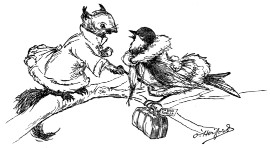
Miss B.—A charming neighborhood! just the thing
For a winter home—
Mrs. C.— Well, I hope, next spring,
When you’re here again, you will try to call.
Miss B.—You are very kind—
Mrs. C.— Oh, not at all!
Miss B.—Good-by, Mrs. Chipmunk.
Mrs. C.— Oh, must you fly?
Then, a pleasant journey!
Miss B.— Good-by!
Mrs. C.— Good-by!

58
The Professor
and the White Violet
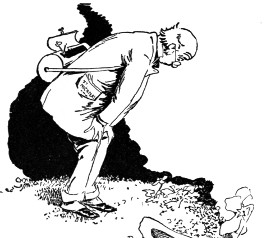
The Professor.
Tell me, little violet white,
If you will be so polite,
Tell me how it came that you
Lost your pretty purple hue?
Were you blanched with sudden fears?
Were you bleached with fairies’ tears?
Or was Dame Nature out of blue,
Violet, when she came to you?
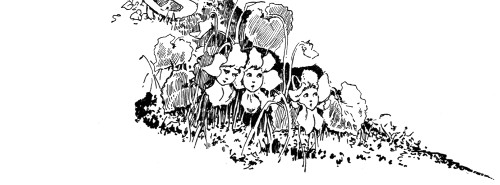
59
The Violet.
Tell me, silly mortal, first,
Ere I satisfy your thirst
For the truth concerning me—
Why you are not like a tree?
Tell me why you move around,
Trying different kinds of ground,
With your funny legs and boots
In the place of proper roots?
Tell me, mortal, why your head,
Where green branches ought to spread,
Is as shiny smooth as glass,
With just a fringe of frosty grass?
Tell me—Why, he’s gone away!
Wonder why he wouldn’t stay?
Can he be—well, I declare!—
Sensitive about his hair?

60
·The·First·Rose·of·Summer·
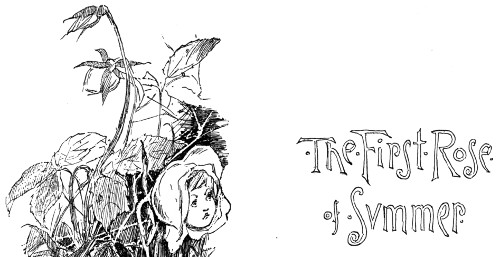
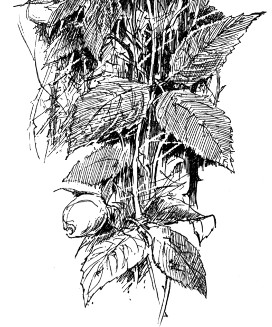
“Oh, dear! is summer over?”
I heard a rosebud moan,
When first her eyes she opened,
And found she was alone.
“Oh, why did summer leave me,
Little me, belated?
Where are the other roses?
I think they might have waited!”
Soon the little rosebud
Saw to her surprise
Other roses opening,
So she dried her eyes.
61
Then I heard her laughing
Gaily in the sun,
“I thought the summer over;
Why, it’s only just begun!”
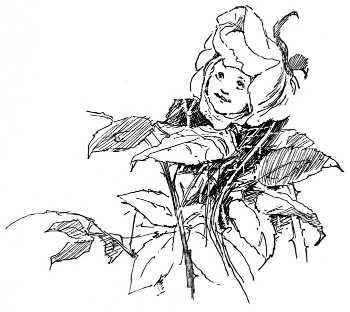
62
The Elf & the
Dormouse

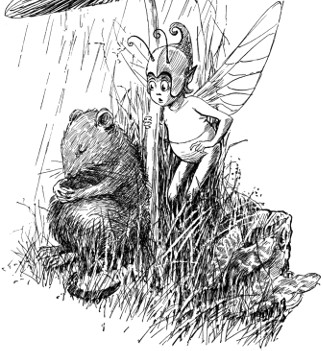
Under a toadstool
Crept a wee Elf,
Out of the rain
To shelter himself.
Under the toadstool,
Sound asleep,
Sat a big Dormouse
All in a heap.
Trembled the wee Elf,
Frightened, and yet
Fearing to fly away
Lest he get wet.
To the next shelter—
Maybe a mile!
Sudden the wee Elf
Smiled a wee smile,
63
Tugged till the toadstool
Toppled in two.
Holding it over him
Gaily he flew.
Soon he was safe home
Dry as could be.
Soon woke the Dormouse—
“Good gracious me!
Where is my toadstool?”
Loud he lamented.
—And that’s how umbrellas,
First were invented.
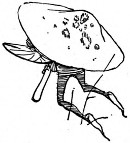
64
The
Crocodile
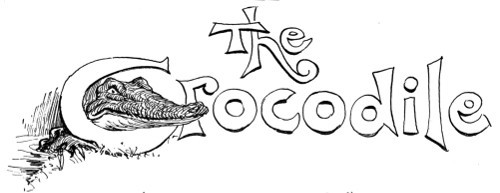
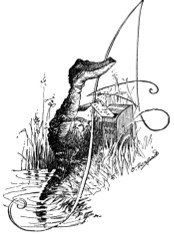
A crocodile once dropped a line
To a Fox to invite him to dine;
But the Fox wrote to say
He was dining, that day,
With a Bird friend, and begged to decline.
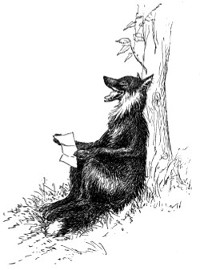
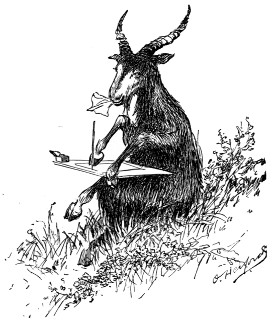
65
She sent off at once to a Goat.
“Pray don’t disappoint me,” she wrote;
But he answered too late,
He’d forgotten the date,
Having thoughtlessly eaten her note.
66
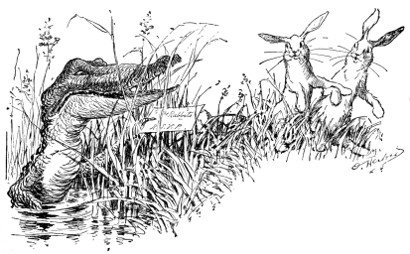
The Crocodile thought him ill-bred,
And invited two Rabbits instead;
But the Rabbits replied,
They were hopelessly tied
By a previous engagement, and fled.
67
Then she wrote in despair to some Eels,
And begged them to “drop in” to meals;
But the Eels left their cards
With their coldest regards,
And took to what went for their heels.
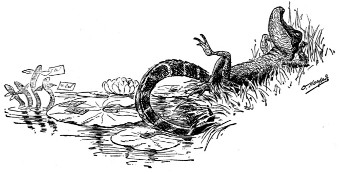
68
Cried the Crocodile then, in disgust,
“My motives they seem to mistrust.
Their suspicions are base,
Since they don’t know their place,—
I suppose if I must starve, I must!”
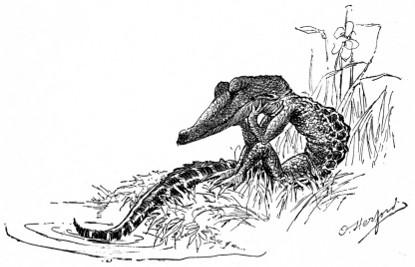
69
The
Forgetful
Forgetmenot.
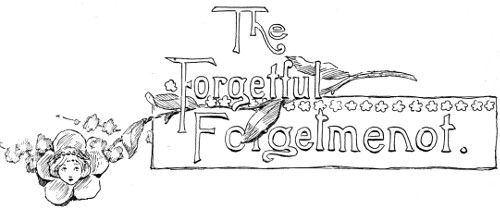
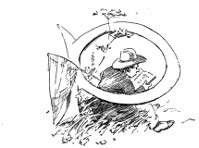
The Professor.
Pray tell me, sweet Forget-me-not,
Oh, kindly tell me where you got
Your curious name?
I’m most desirous to be told
The legend or romance of old
From whence it came.
Forget-me-not.
Indeed, good sir, it seems to me,
If you have books on Botany
Upon your shelf,
You’d better far consult those books—
He learns a thing the best who looks
It up himself.
70
The Professor.
I’ve works on Botany a few,
But though I’ve searched them through and through,
Never a word
Can I discover in the same
About your interesting name.
Forget-me-not.
The Professor.
Quite so! And now what can I do?
I shall be most obliged if you
Will make it plain.
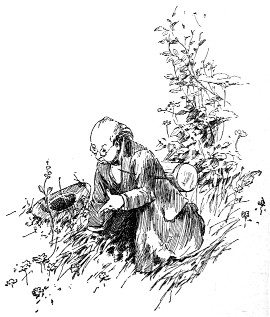
Forget-me-not.
Another time. One moment more,
And you’ll be drenched!
It’s going to pour:
I felt just now no less than four
Big drops of rain.
71
Forget-me-not.
(Aside) Indeed, I’d tell him if I knew;
But it would never, never do
If I explained
That, long ago, I quite forgot
Why I was called Forget-me-not
(It’s well it rained)!
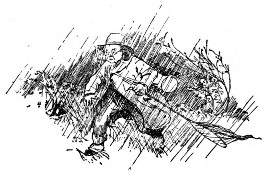
72
The Birds’ Farewell.
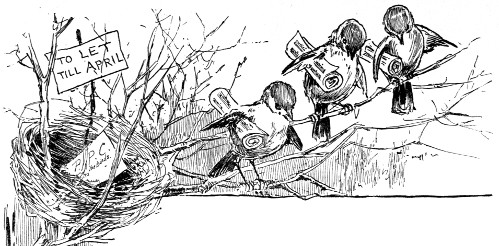

My Dear Little Maid:
We must bid you good-by,
For November is here, and it’s time we should fly
To the South, where we have an engagement to sing,
But, remember this, dear, we’ll return in the spring.
And if, while abroad, we hear anything new,
We’ll learn it, and sing it next summer to you
In the same little tree on the lawn, if you’ll let us.
So, good-by, little maiden! Please do not forget us.
We’re sorry to leave you—too sorry for words,
And we’ll always remain,
Yours sincerely, “The Birds.”
P. S.—Please don’t mind if this letter sounds flat,
And present our respectful regards to your cat.
73
The
Spider’s Tale.
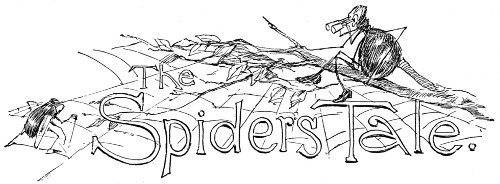
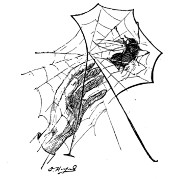
The Poet offereth
to deliver a Fly
from the
Spider’s web.
“Really, Fly, you ought to know
Better, surely, than to go
Into Mr. Spider’s net.
Luckily I’m here to set
You free”; but ere I could have stirred,
Mr. Spider’s voice I heard
Crying in an angry tone:
“Better let my lunch alone!
Even Spiders’
rights must
be respected.
“One would think, for all you care,
Spiders could subsist on air.
Listen to this tale and see
If you don’t agree with me!”
*
*
*
I sat down without a word,
Following is the tale I heard:
74
THE TALE.
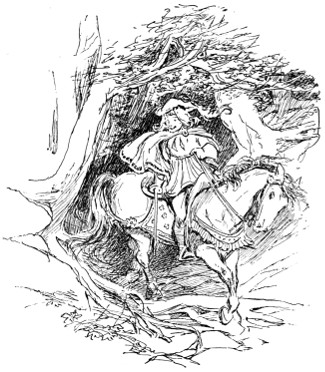
The Spider
spinneth a yarn
to instruct the
Poet
and divert him
that he may forget
about the Fly.
A Prince who sought
His lost Bride, caught
In the toils of a witch,—woe betide her!—
When riding one night
Through a forest, caught sight
Of a Spi in the web of a Flyder.
75
(As perhaps you surmise,
I have tried to disguise,
The names, with the best of intention:
For I make it my plan,
Whenever I can,
To avoid any personal mention.)
Said the Prince to the Spi,
“Supposing that I
Should deliver you out of this hatefulness,
Will you pay me in kind,
And help me to find
My Bride?—Can I count on your gratefulness?”
Said the Spi, “Without doubt,
If you will let me out
From the web of the terrible Flyder,
By all means—oh, yes!
You shall find your Princess,
For I will myself be your guider!”
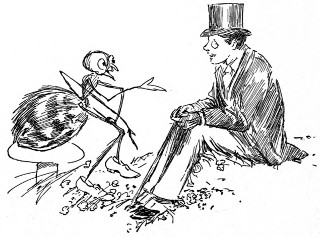
76
The Flyder
does not see it in
the same light as
the Prince.
One jerk! He was free,
And his buzzing and glee
Drove the Prince to the verge of distraction.
The Flyder, meanwhile,
Wore a cynical smile,
And a look of—well—not satisfaction.
The Prince paid no heed,
But mounted his steed,
And started the Princess to find.
The Spi led the way,
But little dreamed they
That the Flyder had mounted behind!
He found her, it’s true,
And the wicked witch, too,
Who fled when he up and defied her;
But while being wed,
Hanging over her head,
The Princess caught sight of the Flyder!
Showing the terrible
consequences
of meddling
with the domestic
affairs of a Flyder.
At the terrible sight,
Her reason took flight,
Till she was completely bereft of it,
When she drained a tureen
Full of cold Paris green,
And the Prince swallowed all that was left of it!
77
Setting forth how
a Poet and a Fly
were both taken
in by a
Spider’s yarn,
and how that a
diverting tale may
speed a good
dinner.
Listening to the Spider, I
Quite forgot poor Mr. Fly
And his pitiable plight
Till the tale was finished quite,
Then, alas! too late I knew,
Mr. Fly was finished, too.
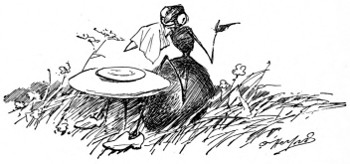
78
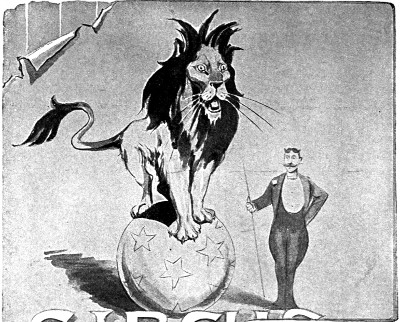
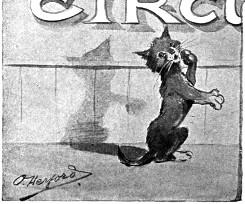
Highly Connected.
“I’m a very little cat,
I know, and thin at that;
But cast your eye upon this poster fine—
The big chap on that ball,
He’s just a King, that’s all—
And, by the way, a relative of mine!”
79
The Miser Elf.
There was a little miser elf who had a precious store
Of silver motes from moonbeams and priceless grains of ore,
And shiny dust of marigold, and glittering jeweled eyes
Of burnished stars and spangles from the wings of butterflies,
And bales of wondrous gossamer and green-gold beetles’ wings,
And many other marvelous and rare and costly things.
But, alas! with all his golden dust and jewels rich and rare,
This little elf was never free from misery and care.
80
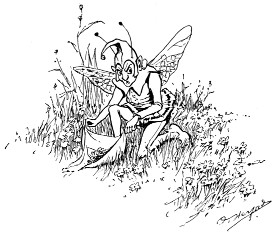
The wealth that might have conjured up all good things at his beck
Was just a golden millstone that hung around his neck.
He never had one moment’s peace, his treasure out of sight,
Though he buried it for safety in a different place each night;
Each night the thought of robbers made him close his eyes in vain,
And just as soon as it was light he’d dig it up again.
One night (it was a woodland place in which he chanced to bide)—
As usual he sought a place in which his gold to hide.
He had not long been seeking before he chanced to see
A thing he’d never seen before—a curious kind of tree:
81
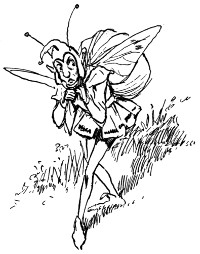
The stem was smooth and straight, and on the top there grew a sort
Of dome or hat—let’s call it an umbrella-tree, for short.
“The very place!” exclaimed the elf. “So strange a tree, ’tis clear,
Is just the thing to mark the spot. I’ll hide my treasure here.”
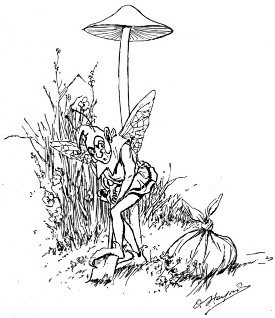
No sooner said than done; and then, his treasure buried deep,
Upon a bed of moss near by he laid him down to sleep.
For once the elf enjoyed a night from dreams and terrors free;
And, waking, sought with bounding step his tall umbrella-tree.
82
“Ah, here it is!” he cried; and sure enough, before his sight
It stood. “But what is this?” Another like it to the right!
“Which can it be?” He rubbed his chin. “What underneath the sun
Has happened? Why, I could have sworn last night there was but one.
Which can it be that marks the spot in which my treasure lies?”
And looking round, another tree of the same shape and size,
Another and another still met his astonished eyes.
Then the dreadful truth burst on him, and he stood transfixed with fright
In a forest of umbrella-trees all grown up in a night.
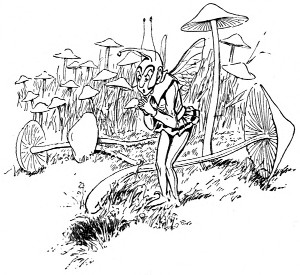
83
When walking in the autumn woods, dear reader, and you pass
A toadstool lying on its side among the leaves and grass,
Think of the little miser elf, for ’tis a sign that he
Still digs for his lost treasure underneath the umbrella-tree.

84
The Point of View.
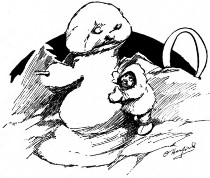
On the top of the world, where there’s lots of snow,
As all the geographies say,
A small Eskimo, just to make the time go,
Was building a Snow Man one day.
Now it happened by chance that two Polar Bears
Came strolling along that way:
“Perhaps it is none of our affairs,
But what are you making?” said they.
“A Snow Man, of course,” said the Eskimo;
The Bears gave a comical stare;
85
Said they, “If you must make a person of snow,
Why on earth don’t you make a Snow Bear?”
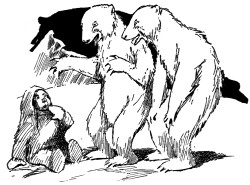
He sat himself down for a moment to think
Of some suitable sort of reply,
When a Penguin, two Foxes, a Seal, and a Mink,
And a Walrus came wandering by.
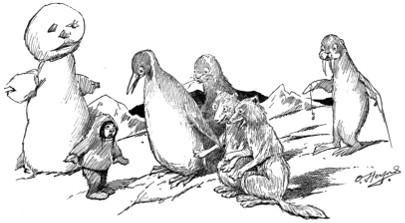
86
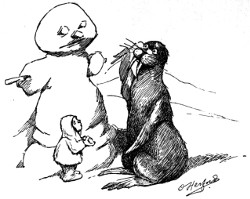
They stopped just a casual look to take,
A casual word to say,
And each had a trifling suggestion to make
In a patronizing way.
The Walrus said, “Really, it isn’t half bad,
And shows lots of promise, you know;
Yet I think, for my part, though perhaps it’s a fad,
A Snow Walrus were more apropos.”
The Foxes, the Seal, and the Mink were afraid
They knew little of art, so they said,
But they thought he would show better taste if he made
A Fox, Seal, or Mink in its stead.
87
The Penguin said nothing, nor listened, but when
They’d finished, he ventured to say,
“It doesn’t look much like a Penguin, but then
Perhaps when completed, it may.”
They turned then to go; but the Eskimo—
Alas! he was seen no more;
The heat of his anger and shame and chagrin
Had melted the snow where the crust was thin,
And he’d sunk, so to speak, through the floor.
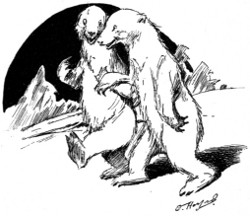
88
Heroes.
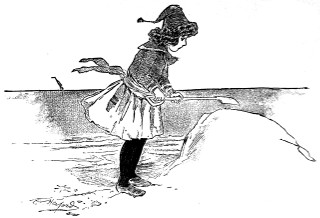

I built a castle on the shore,
And left to guard it three or four
Lead soldiers of the bravest sort,
And ordered them to hold the fort
Till I should come once more.
But when I came again next day,
I found the sea had washed away
My castle built upon the sand.
Alas! the gallant little band
Of soldiers, where were they?
Buried in sand, erect, and square,
They held the fort with martial air;
And when I’d said a little speech,
I dug them out and made them each
A general then and there.
89
A
Belated Violet
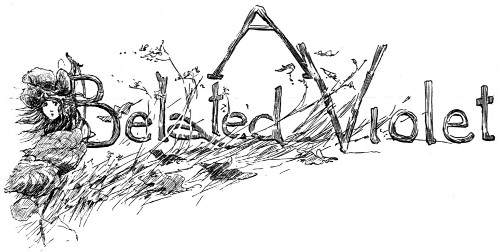
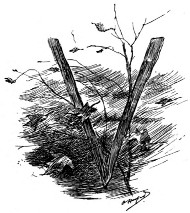
Very dark the autumn sky,
Dark the clouds that hurried by;
Very rough the autumn breeze
Shouting rudely to the trees.
Listening, frightened, pale, and cold,
Through the withered leaves and mold
Peer’d a violet all in dread—
“Where, oh, where is spring?” she said.
Sighed the trees, “Poor little thing!
She may call in vain for spring.”
And the grasses whispered low,
“We must never let her know.”
90
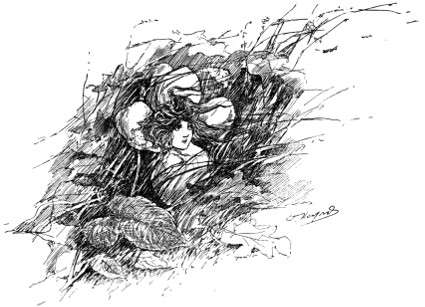
“What’s this whispering?” roared the breeze,
“Hush! a violet!” sobbed the trees,
“Thinks it’s spring—poor child, we fear
She will die if she should hear!”
Softly stole the wind away,
Tenderly he murmured, “Stay!”
To a late thrush on the wing,
“Stay with her one day and sing!”
Sang the thrush so sweet and clear
That the sun came out to hear,
And, in answer to her song,
Beamed on violet all day long.
91
And the last leaves here and there
Fluttered with a spring-like air,
Then the violet raised her head—
“Spring has come at last!” she said.
Happy dreams had violet
All that night—but happier yet,
When the dawn came dark with snow,
Violet never woke to know.
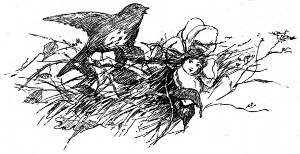
92
The Parrot and the Cuckoo.
A Tragedy.
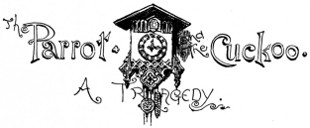
Scene: The vicinity of the Cuckoo Clock. Cuckoo discovered in the act
of telling three o’clock. Parrot watching from a perch near by.
Cuckoo: Cuckoo! Cuckoo! Cuckoo!
Parrot: Hark, there she goes!
To hear her any parrot would suppose
She owned the earth, conceited little thing,
She really seems to fancy she can sing,
Yet, though you’ll scarce believe, that little bird
Rules the whole blessed household with a word.
She only has to call “Cuckoo!” and lo!
93
The family at once to luncheon go.
When she screams “Cuckoo!” twice it is the rule
For all the kids to hurry back to school—
And when six times they know it is a sign
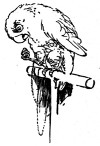 That Cuckoo thinks it’s time for them to dine.
That Cuckoo thinks it’s time for them to dine.
And so it goes through all the livelong day,
She tells them what to do and they obey.
But as for me, they treat me like a doll
And mimic me and call me “Pretty Poll,”
And ask me several million times a day,
“Does Polly want a cracker?”—by the way,
I’ve yet to see that cracker—oh, sometimes
I gnash my beak, or mutter nursery rhymes
Or anything! for fear I should let slip
The wicked words they taught me on the ship,
Those naughty sailors, when long, long ago
They brought me from the land where spices grow
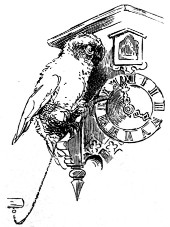 And palm-trees wave, and Cuckoos do not rule
And palm-trees wave, and Cuckoos do not rule
And tell folks when to bed and when to school
And when to go to dinner.
Never mind!
My time will come. As that vain bird will find
Unto her sorrow. Yes, the die is cast!
Next time the Cuckoo squawks will be her last.
94
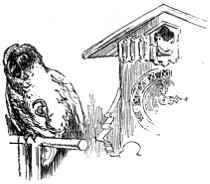
Next time she tries—
Cuckoo (striking four o’clock): Cuckoo! Cuckoo! Cuckoo!
Parrot: Come, now, have done! we’ve heard enough from you!
Prepare to die! your little reign is o’er,
Over this house you’ll tyrannize no more!
What! won’t you come? then I’ll soon show you how!
There! stop that racket; heavens, what a row!
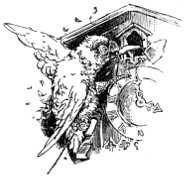
95
(Smashes the Cuckoo to bits, causing the machinery to run down.)
(It stops.)
Well, upon my word,
You’re tough for such a very little bird,
I thought you’d never die! and now, my dear,
The family will very soon be here,
And when they see how little’s left of you
They’ll be so glad they won’t know what to do—
To think the Cuckoo’s killed and they are free
To work or play or sleep or take their tea
Just when they please—and, best of all, how jolly
To feel they owe it all to “Pretty Polly”!
(Curtain.)
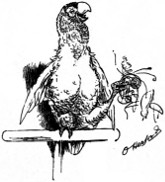
96
The Elf and the Bee.


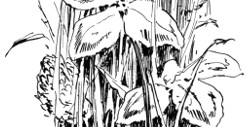
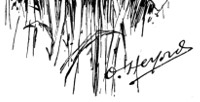
“Oh, Bumblebee! Bumblebee!
Don’t fly so near!
Or you will tumble me
Over, I fear!”
“Oh, funny Elf! Funny Elf!
Don’t be alarmed!
I’m looking for honey, Elf.
You sha’n’t be harmed.”
“Then tarry,
Oh, tarry, Bee!
Fill up your sack;
And carry, oh, carry me
Home on your back!”
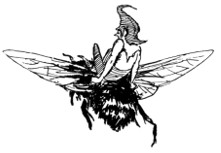
97
A Fable.
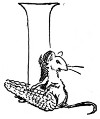
It was a hungry pussy cat
Upon Thanksgiving morn,
And she watched a thankful little mouse
That ate an ear of corn.
“If I ate that thankful little mouse,
How thankful he should be,
When he has made a meal himself,
To make a meal for me!
“Then, with his thanks for having fed
And his thanks for feeding me—
With all his thankfulness inside—
How thankful I shall be!”
Thus mused the hungry pussy cat
Upon Thanksgiving Day.
But the little mouse had overheard,
And declined (with thanks) to stay.
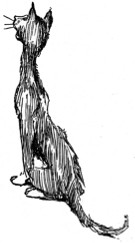
98
The Fairies’ Concert.
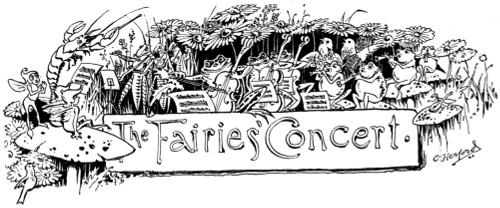

In a fairy forest known
To the fairy-folk alone,
Where the grasses meet and spread
Like a green roof overhead,
Where the dandelion-tree
Towers tall as tall can be,
And the ferns lift up their high
Fairy ladders to the sky,
For the elves to climb upon—
Here are merry goings-on.
From the forest far and near
All the fairy-folk are here,
For to-day there is to be
Music ’neath the daisy-tree.
99


And the creatures of the wood,
One and all, have been so good
And obliging as to say,
They will gladly come and play
For the elves a serenade,
In the fairy forest glade.
All the little birds have come;
And the bumblebees that hum;
And the gnats that twang the lute;
And the frogs that play the flute;
And the kind of frog whose toots
Seem to come from out his boots;
And the great big green and yellow
Frog that plays upon the ’cello;
And the katydid, in green,
Who is oftener heard than seen;
With the little ladybird
Who is oftener seen than heard;
And the cricket, never still
With his lively legs and trill.
And, in short, each forest thing
That can hum, or buzz, or sing,
Each and all have come to play
For the little elves to-day.
Now the crawfish takes the stand
To conduct the fairy band.
First there is a moment’s pause,
Then the leader lifts his claws,
Waves his wand, and—one, two, three!
All at once, from gnat and bee,
Frog, and katydid, and bird
100


Such a melody is heard
That the elves and fairies wee,
Clapping little hands with glee,
Make their mushroom seat to sway
In a very risky way.
And the creatures in delight
Play away with all their might,
Feeling very justly proud
That the elves applaud so loud.
Now the sun is getting low,
And the elves to bed must go
Ere the sleepy flowers close
In whose petals they repose;
For if they were late they might
Have to stay outside all night.
So the last good-byes are said;
Every one goes home to bed;
And the creatures as they fly
Play a fairy lullaby,
Growing faint and fainter still,
Fainter and more faint, until
All is silent—and the shade
Creeps upon the fairy glade.
Transcriber’s Note:
Obvious printer errors corrected silently.
Inconsistent spelling and hyphenation are as in the original.
End of the Project Gutenberg EBook of Artful Anticks, by Oliver Herford
*** END OF THIS PROJECT GUTENBERG EBOOK ARTFUL ANTICKS ***
***** This file should be named 57325-h.htm or 57325-h.zip *****
This and all associated files of various formats will be found in:
http://www.gutenberg.org/5/7/3/2/57325/
Produced by David Edwards, Wayne Hammond and the Online
Distributed Proofreading Team at http://www.pgdp.net (This
file was produced from images generously made available
by The Internet Archive)
Updated editions will replace the previous one--the old editions will
be renamed.
Creating the works from print editions not protected by U.S. copyright
law means that no one owns a United States copyright in these works,
so the Foundation (and you!) can copy and distribute it in the United
States without permission and without paying copyright
royalties. Special rules, set forth in the General Terms of Use part
of this license, apply to copying and distributing Project
Gutenberg-tm electronic works to protect the PROJECT GUTENBERG-tm
concept and trademark. Project Gutenberg is a registered trademark,
and may not be used if you charge for the eBooks, unless you receive
specific permission. If you do not charge anything for copies of this
eBook, complying with the rules is very easy. You may use this eBook
for nearly any purpose such as creation of derivative works, reports,
performances and research. They may be modified and printed and given
away--you may do practically ANYTHING in the United States with eBooks
not protected by U.S. copyright law. Redistribution is subject to the
trademark license, especially commercial redistribution.
START: FULL LICENSE
THE FULL PROJECT GUTENBERG LICENSE
PLEASE READ THIS BEFORE YOU DISTRIBUTE OR USE THIS WORK
To protect the Project Gutenberg-tm mission of promoting the free
distribution of electronic works, by using or distributing this work
(or any other work associated in any way with the phrase "Project
Gutenberg"), you agree to comply with all the terms of the Full
Project Gutenberg-tm License available with this file or online at
www.gutenberg.org/license.
Section 1. General Terms of Use and Redistributing Project
Gutenberg-tm electronic works
1.A. By reading or using any part of this Project Gutenberg-tm
electronic work, you indicate that you have read, understand, agree to
and accept all the terms of this license and intellectual property
(trademark/copyright) agreement. If you do not agree to abide by all
the terms of this agreement, you must cease using and return or
destroy all copies of Project Gutenberg-tm electronic works in your
possession. If you paid a fee for obtaining a copy of or access to a
Project Gutenberg-tm electronic work and you do not agree to be bound
by the terms of this agreement, you may obtain a refund from the
person or entity to whom you paid the fee as set forth in paragraph
1.E.8.
1.B. "Project Gutenberg" is a registered trademark. It may only be
used on or associated in any way with an electronic work by people who
agree to be bound by the terms of this agreement. There are a few
things that you can do with most Project Gutenberg-tm electronic works
even without complying with the full terms of this agreement. See
paragraph 1.C below. There are a lot of things you can do with Project
Gutenberg-tm electronic works if you follow the terms of this
agreement and help preserve free future access to Project Gutenberg-tm
electronic works. See paragraph 1.E below.
1.C. The Project Gutenberg Literary Archive Foundation ("the
Foundation" or PGLAF), owns a compilation copyright in the collection
of Project Gutenberg-tm electronic works. Nearly all the individual
works in the collection are in the public domain in the United
States. If an individual work is unprotected by copyright law in the
United States and you are located in the United States, we do not
claim a right to prevent you from copying, distributing, performing,
displaying or creating derivative works based on the work as long as
all references to Project Gutenberg are removed. Of course, we hope
that you will support the Project Gutenberg-tm mission of promoting
free access to electronic works by freely sharing Project Gutenberg-tm
works in compliance with the terms of this agreement for keeping the
Project Gutenberg-tm name associated with the work. You can easily
comply with the terms of this agreement by keeping this work in the
same format with its attached full Project Gutenberg-tm License when
you share it without charge with others.
1.D. The copyright laws of the place where you are located also govern
what you can do with this work. Copyright laws in most countries are
in a constant state of change. If you are outside the United States,
check the laws of your country in addition to the terms of this
agreement before downloading, copying, displaying, performing,
distributing or creating derivative works based on this work or any
other Project Gutenberg-tm work. The Foundation makes no
representations concerning the copyright status of any work in any
country outside the United States.
1.E. Unless you have removed all references to Project Gutenberg:
1.E.1. The following sentence, with active links to, or other
immediate access to, the full Project Gutenberg-tm License must appear
prominently whenever any copy of a Project Gutenberg-tm work (any work
on which the phrase "Project Gutenberg" appears, or with which the
phrase "Project Gutenberg" is associated) is accessed, displayed,
performed, viewed, copied or distributed:
This eBook is for the use of anyone anywhere in the United States and
most other parts of the world at no cost and with almost no
restrictions whatsoever. You may copy it, give it away or re-use it
under the terms of the Project Gutenberg License included with this
eBook or online at www.gutenberg.org. If you are not located in the
United States, you'll have to check the laws of the country where you
are located before using this ebook.
1.E.2. If an individual Project Gutenberg-tm electronic work is
derived from texts not protected by U.S. copyright law (does not
contain a notice indicating that it is posted with permission of the
copyright holder), the work can be copied and distributed to anyone in
the United States without paying any fees or charges. If you are
redistributing or providing access to a work with the phrase "Project
Gutenberg" associated with or appearing on the work, you must comply
either with the requirements of paragraphs 1.E.1 through 1.E.7 or
obtain permission for the use of the work and the Project Gutenberg-tm
trademark as set forth in paragraphs 1.E.8 or 1.E.9.
1.E.3. If an individual Project Gutenberg-tm electronic work is posted
with the permission of the copyright holder, your use and distribution
must comply with both paragraphs 1.E.1 through 1.E.7 and any
additional terms imposed by the copyright holder. Additional terms
will be linked to the Project Gutenberg-tm License for all works
posted with the permission of the copyright holder found at the
beginning of this work.
1.E.4. Do not unlink or detach or remove the full Project Gutenberg-tm
License terms from this work, or any files containing a part of this
work or any other work associated with Project Gutenberg-tm.
1.E.5. Do not copy, display, perform, distribute or redistribute this
electronic work, or any part of this electronic work, without
prominently displaying the sentence set forth in paragraph 1.E.1 with
active links or immediate access to the full terms of the Project
Gutenberg-tm License.
1.E.6. You may convert to and distribute this work in any binary,
compressed, marked up, nonproprietary or proprietary form, including
any word processing or hypertext form. However, if you provide access
to or distribute copies of a Project Gutenberg-tm work in a format
other than "Plain Vanilla ASCII" or other format used in the official
version posted on the official Project Gutenberg-tm web site
(www.gutenberg.org), you must, at no additional cost, fee or expense
to the user, provide a copy, a means of exporting a copy, or a means
of obtaining a copy upon request, of the work in its original "Plain
Vanilla ASCII" or other form. Any alternate format must include the
full Project Gutenberg-tm License as specified in paragraph 1.E.1.
1.E.7. Do not charge a fee for access to, viewing, displaying,
performing, copying or distributing any Project Gutenberg-tm works
unless you comply with paragraph 1.E.8 or 1.E.9.
1.E.8. You may charge a reasonable fee for copies of or providing
access to or distributing Project Gutenberg-tm electronic works
provided that
* You pay a royalty fee of 20% of the gross profits you derive from
the use of Project Gutenberg-tm works calculated using the method
you already use to calculate your applicable taxes. The fee is owed
to the owner of the Project Gutenberg-tm trademark, but he has
agreed to donate royalties under this paragraph to the Project
Gutenberg Literary Archive Foundation. Royalty payments must be paid
within 60 days following each date on which you prepare (or are
legally required to prepare) your periodic tax returns. Royalty
payments should be clearly marked as such and sent to the Project
Gutenberg Literary Archive Foundation at the address specified in
Section 4, "Information about donations to the Project Gutenberg
Literary Archive Foundation."
* You provide a full refund of any money paid by a user who notifies
you in writing (or by e-mail) within 30 days of receipt that s/he
does not agree to the terms of the full Project Gutenberg-tm
License. You must require such a user to return or destroy all
copies of the works possessed in a physical medium and discontinue
all use of and all access to other copies of Project Gutenberg-tm
works.
* You provide, in accordance with paragraph 1.F.3, a full refund of
any money paid for a work or a replacement copy, if a defect in the
electronic work is discovered and reported to you within 90 days of
receipt of the work.
* You comply with all other terms of this agreement for free
distribution of Project Gutenberg-tm works.
1.E.9. If you wish to charge a fee or distribute a Project
Gutenberg-tm electronic work or group of works on different terms than
are set forth in this agreement, you must obtain permission in writing
from both the Project Gutenberg Literary Archive Foundation and The
Project Gutenberg Trademark LLC, the owner of the Project Gutenberg-tm
trademark. Contact the Foundation as set forth in Section 3 below.
1.F.
1.F.1. Project Gutenberg volunteers and employees expend considerable
effort to identify, do copyright research on, transcribe and proofread
works not protected by U.S. copyright law in creating the Project
Gutenberg-tm collection. Despite these efforts, Project Gutenberg-tm
electronic works, and the medium on which they may be stored, may
contain "Defects," such as, but not limited to, incomplete, inaccurate
or corrupt data, transcription errors, a copyright or other
intellectual property infringement, a defective or damaged disk or
other medium, a computer virus, or computer codes that damage or
cannot be read by your equipment.
1.F.2. LIMITED WARRANTY, DISCLAIMER OF DAMAGES - Except for the "Right
of Replacement or Refund" described in paragraph 1.F.3, the Project
Gutenberg Literary Archive Foundation, the owner of the Project
Gutenberg-tm trademark, and any other party distributing a Project
Gutenberg-tm electronic work under this agreement, disclaim all
liability to you for damages, costs and expenses, including legal
fees. YOU AGREE THAT YOU HAVE NO REMEDIES FOR NEGLIGENCE, STRICT
LIABILITY, BREACH OF WARRANTY OR BREACH OF CONTRACT EXCEPT THOSE
PROVIDED IN PARAGRAPH 1.F.3. YOU AGREE THAT THE FOUNDATION, THE
TRADEMARK OWNER, AND ANY DISTRIBUTOR UNDER THIS AGREEMENT WILL NOT BE
LIABLE TO YOU FOR ACTUAL, DIRECT, INDIRECT, CONSEQUENTIAL, PUNITIVE OR
INCIDENTAL DAMAGES EVEN IF YOU GIVE NOTICE OF THE POSSIBILITY OF SUCH
DAMAGE.
1.F.3. LIMITED RIGHT OF REPLACEMENT OR REFUND - If you discover a
defect in this electronic work within 90 days of receiving it, you can
receive a refund of the money (if any) you paid for it by sending a
written explanation to the person you received the work from. If you
received the work on a physical medium, you must return the medium
with your written explanation. The person or entity that provided you
with the defective work may elect to provide a replacement copy in
lieu of a refund. If you received the work electronically, the person
or entity providing it to you may choose to give you a second
opportunity to receive the work electronically in lieu of a refund. If
the second copy is also defective, you may demand a refund in writing
without further opportunities to fix the problem.
1.F.4. Except for the limited right of replacement or refund set forth
in paragraph 1.F.3, this work is provided to you 'AS-IS', WITH NO
OTHER WARRANTIES OF ANY KIND, EXPRESS OR IMPLIED, INCLUDING BUT NOT
LIMITED TO WARRANTIES OF MERCHANTABILITY OR FITNESS FOR ANY PURPOSE.
1.F.5. Some states do not allow disclaimers of certain implied
warranties or the exclusion or limitation of certain types of
damages. If any disclaimer or limitation set forth in this agreement
violates the law of the state applicable to this agreement, the
agreement shall be interpreted to make the maximum disclaimer or
limitation permitted by the applicable state law. The invalidity or
unenforceability of any provision of this agreement shall not void the
remaining provisions.
1.F.6. INDEMNITY - You agree to indemnify and hold the Foundation, the
trademark owner, any agent or employee of the Foundation, anyone
providing copies of Project Gutenberg-tm electronic works in
accordance with this agreement, and any volunteers associated with the
production, promotion and distribution of Project Gutenberg-tm
electronic works, harmless from all liability, costs and expenses,
including legal fees, that arise directly or indirectly from any of
the following which you do or cause to occur: (a) distribution of this
or any Project Gutenberg-tm work, (b) alteration, modification, or
additions or deletions to any Project Gutenberg-tm work, and (c) any
Defect you cause.
Section 2. Information about the Mission of Project Gutenberg-tm
Project Gutenberg-tm is synonymous with the free distribution of
electronic works in formats readable by the widest variety of
computers including obsolete, old, middle-aged and new computers. It
exists because of the efforts of hundreds of volunteers and donations
from people in all walks of life.
Volunteers and financial support to provide volunteers with the
assistance they need are critical to reaching Project Gutenberg-tm's
goals and ensuring that the Project Gutenberg-tm collection will
remain freely available for generations to come. In 2001, the Project
Gutenberg Literary Archive Foundation was created to provide a secure
and permanent future for Project Gutenberg-tm and future
generations. To learn more about the Project Gutenberg Literary
Archive Foundation and how your efforts and donations can help, see
Sections 3 and 4 and the Foundation information page at
www.gutenberg.org Section 3. Information about the Project Gutenberg
Literary Archive Foundation
The Project Gutenberg Literary Archive Foundation is a non profit
501(c)(3) educational corporation organized under the laws of the
state of Mississippi and granted tax exempt status by the Internal
Revenue Service. The Foundation's EIN or federal tax identification
number is 64-6221541. Contributions to the Project Gutenberg Literary
Archive Foundation are tax deductible to the full extent permitted by
U.S. federal laws and your state's laws.
The Foundation's principal office is in Fairbanks, Alaska, with the
mailing address: PO Box 750175, Fairbanks, AK 99775, but its
volunteers and employees are scattered throughout numerous
locations. Its business office is located at 809 North 1500 West, Salt
Lake City, UT 84116, (801) 596-1887. Email contact links and up to
date contact information can be found at the Foundation's web site and
official page at www.gutenberg.org/contact
For additional contact information:
Dr. Gregory B. Newby
Chief Executive and Director
gbnewby@pglaf.org
Section 4. Information about Donations to the Project Gutenberg
Literary Archive Foundation
Project Gutenberg-tm depends upon and cannot survive without wide
spread public support and donations to carry out its mission of
increasing the number of public domain and licensed works that can be
freely distributed in machine readable form accessible by the widest
array of equipment including outdated equipment. Many small donations
($1 to $5,000) are particularly important to maintaining tax exempt
status with the IRS.
The Foundation is committed to complying with the laws regulating
charities and charitable donations in all 50 states of the United
States. Compliance requirements are not uniform and it takes a
considerable effort, much paperwork and many fees to meet and keep up
with these requirements. We do not solicit donations in locations
where we have not received written confirmation of compliance. To SEND
DONATIONS or determine the status of compliance for any particular
state visit www.gutenberg.org/donate
While we cannot and do not solicit contributions from states where we
have not met the solicitation requirements, we know of no prohibition
against accepting unsolicited donations from donors in such states who
approach us with offers to donate.
International donations are gratefully accepted, but we cannot make
any statements concerning tax treatment of donations received from
outside the United States. U.S. laws alone swamp our small staff.
Please check the Project Gutenberg Web pages for current donation
methods and addresses. Donations are accepted in a number of other
ways including checks, online payments and credit card donations. To
donate, please visit: www.gutenberg.org/donate
Section 5. General Information About Project Gutenberg-tm electronic works.
Professor Michael S. Hart was the originator of the Project
Gutenberg-tm concept of a library of electronic works that could be
freely shared with anyone. For forty years, he produced and
distributed Project Gutenberg-tm eBooks with only a loose network of
volunteer support.
Project Gutenberg-tm eBooks are often created from several printed
editions, all of which are confirmed as not protected by copyright in
the U.S. unless a copyright notice is included. Thus, we do not
necessarily keep eBooks in compliance with any particular paper
edition.
Most people start at our Web site which has the main PG search
facility: www.gutenberg.org
This Web site includes information about Project Gutenberg-tm,
including how to make donations to the Project Gutenberg Literary
Archive Foundation, how to help produce our new eBooks, and how to
subscribe to our email newsletter to hear about new eBooks.
 vii
vii vii
vii























































































































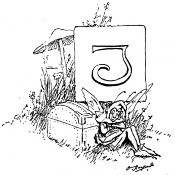

















 That Cuckoo thinks it’s time for them to dine.
That Cuckoo thinks it’s time for them to dine. And palm-trees wave, and Cuckoos do not rule
And palm-trees wave, and Cuckoos do not rule














